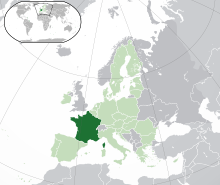LGBTQ rights in France | |
|---|---|
 Location of Metropolitan France (dark green) – in Europe (light green & dark grey) | |
| Status | Homosexuality decriminalized since 1791, age of consent (re)equalised in 1982 |
| Gender identity | Transgender people allowed to change legal gender without surgery |
| Military | LGBT people allowed to serve openly |
| Discrimination protections | Sexual orientation and gender identity protections (see below) |
| Family rights | |
| Recognition of relationships | Civil solidarity pact since 1999 Same-sex marriage since 2013 |
| Adoption | Full adoption rights since 2013 |
Lesbian, gay, bisexual, transgender, and queer (LGBTQ) rights in France are some of the most progressive by world standards.[1][2] Although same-sex sexual activity was a capital crime that often resulted in the death penalty during the Ancien Régime, all sodomy laws were repealed in 1791 during the French Revolution. However, a lesser-known indecent exposure law that often targeted LGBTQ people was introduced in 1960, before being repealed in 1980.
The age of consent for same-sex sexual activity was altered more than once before being equalised in 1982 under President François Mitterrand. After granting same-sex couples domestic partnership benefits known as the civil solidarity pact in 1999, France became the thirteenth country in the world to legalise same-sex marriage in 2013. Laws prohibiting discrimination on the basis of sexual orientation and gender identity were enacted in 1985 and 2012, respectively. In 2010, France became the first country in the world to declassify gender dysphoria as a mental illness. Additionally, since 2017, transgender people have been allowed to change their legal gender without undergoing surgery or receiving any medical diagnosis.[3]
France has frequently been named one of the most gay-friendly countries in the world.[3] Recent polls have indicated that a majority of the French people support same-sex marriage and in 2013,[4] another poll indicated that 77% of the French population believed homosexuality should be accepted by society, one of the highest in the 39 countries polled.[5] During his tenure (January to September 2024), Gabriel Attal, the country's prime minister, was one of the few openly gay heads of government in the world.[6] Paris has been named by many publications as one of the most gay-friendly cities in the world, with a thriving LGBTQ community and nightlife in Le Marais, Quartier Pigalle and Bois de Boulogne.[7]
- ^ Cite error: The named reference
marriagewas invoked but never defined (see the help page). - ^ "The 203 Worst (& Safest) Countries for LGBTQ+ Travel in 2023". Asher & Lyric. 5 June 2023. Retrieved 20 August 2023.
- ^ a b Cite error: The named reference
rainbowwas invoked but never defined (see the help page). - ^ "Yagg". Tetu.com. 24 January 2013. Archived from the original on 2 September 2011. Retrieved 21 November 2013.
- ^ "The 20 most and least gay-friendly countries in the world". GlobalPost. 26 June 2013. Retrieved 21 November 2013.
- ^ Willsher, Kim (9 January 2024). "Who is Gabriel Attal, the French PM who climbed the ranks in record time?". The Guardian. Archived from the original on 9 January 2024. Retrieved 9 January 2024.
- ^ "Paris The city of Proust and Piaf is a natural environment for a flourishin". The Independent. 17 September 2008. Retrieved 21 November 2013.